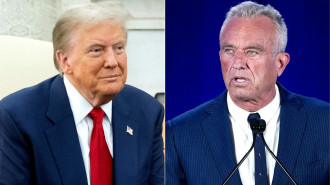Battle for Mosul could last 'longer than a year'
Battle for Mosul could last 'longer than a year'
A top US general has suggested the fight to push Islamic State militants out of Mosul and Iraq could last more than a year and that setbacks should be expected.
3 min read
A US commander is expecting a long and complex battle in northern Iraq [Getty]
A senior United States general has suggested the major operation to retake Mosul could last longer than a year.
Iraqi forces, including a US-led coalition, this week launched what is touted to be the biggest battle yet against the Islamic State group.
"It certainly will be a difficult operation and IS has certainly had a long time to prepare for this operation," said General Joseph Votel, Commander of US Central Command.
"The operation we did to Manbij in northern Syria took about 71 days to complete from start to finish. Raqqa is about three times the size of Manbij, Mosul is about three times the size of Raqqa. So we should expect it's going to take some time to [complete] that."
Iraqi Prime Minister Haider al-Abadi said on Thursday the offensive to liberate the country's second city was progressing faster than expected.
But Votel, speaking at a panel discussion hosted by the think tank, Centre for American Progress, said forces were trying to achieve a "ying and yang" approach.
"We want to move fast enough that we keep pressure on the enemy but we want to move slow enough that we don't add to the human disaster that could take place there," he said.
"It's going to be a complex fight," he added. "There is going to a lot to contend with and we should expect there'll be some setbacks, there'll be some very heavy fighting."
Votel said the plan of attack was a "simple approach"of pressure and momentum, going after IS resources, including oil, its leadership and information operations.
In response to a question over whether an offensive to retake Raqqa in Syria, the militants' de facto capital, could occur at the same time, Votel did not deny that could be the case, saying: "When we apply pressure on Islamic State forces they do squirt out.
"They try to go to their locations, they move leaders, they move the bulk of their forces, so I think it's the simultaneous application of pressure that's very important for the campaigns."
"They try to go to their locations, they move leaders, they move the bulk of their forces, so I think it's the simultaneous application of pressure that's very important for the campaigns."
Votel described IS as an "adaptive enemy" and said the threat of chemical weapons being used on Iraqi and coalition forces "has not been tactfully or operationally significant but it is concerning, there is a psychological impact to it".
On the unfolding humanitarian crisis and warnings of an overwhelming mass exodus of civilians fleeing the conflict, Votel said he was "pretty pleased" with the planning in place.
"We learned a lot from Fallujah," he said. "[The Iraqi government has] done a pretty good job through information operations, leaflet drops, radio, to try to communicate to people: 'If you are not in dire problem, stay where you are, don't move, don't contribute to [internally displaced people]'."







 Follow the Middle East's top stories in English at The New Arab on Google News
Follow the Middle East's top stories in English at The New Arab on Google News

![The meeting between Musk and Iravani was 'positive', Iranian sources said [Getty]](/sites/default/files/styles/image_330x185/public/2024-11/GettyImages-2184077711.jpg?h=f5c1ac2a&itok=Wb2mIhsF)
![Dutch politicians have used harsh rhetoric against the country's Muslims following Israeli-instigated violence [Getty]](/sites/default/files/styles/image_330x185/public/2024-11/GettyImages-2184046796.jpg?h=199d8c1f&itok=3kSTEWRC)